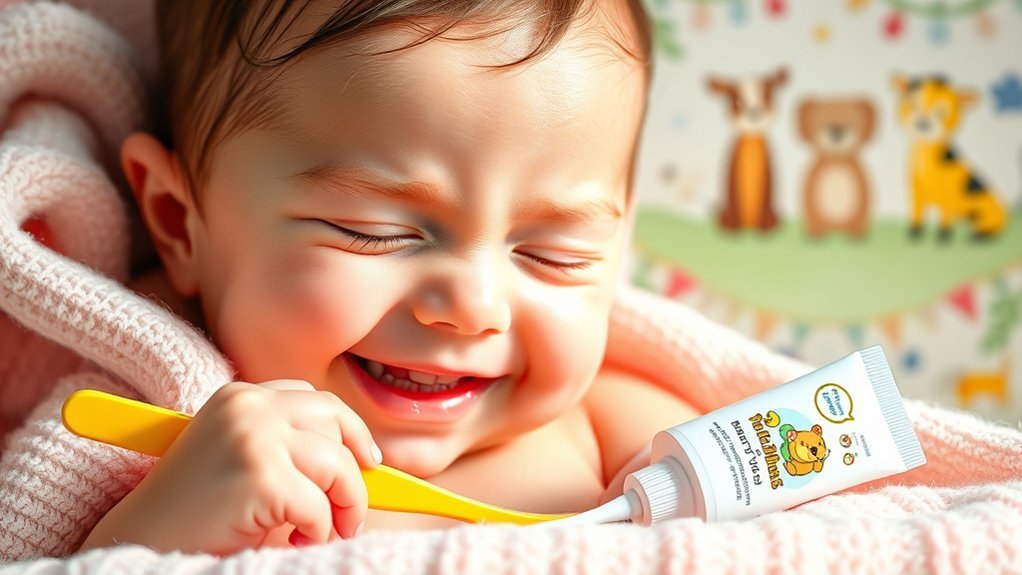Taking care of your baby’s oral health is vital for their overall well-being. You might not realize it, but good habits start early, even before those tiny teeth come in. Cleaning your baby’s gums and choosing the right products can make a big difference. Plus, knowing when to schedule that first dental visit is essential. So, what are the best practices you can adopt to guarantee a healthy smile for your little one?
Understanding the Importance of Baby Teeth
While it might seem like baby teeth are just temporary, they play an important role in your child’s development.
These little teeth help your child chew food properly, which is essential for their nutrition. They also hold space in the jaw for permanent teeth, guiding them as they emerge. If baby teeth are lost too early, it can lead to misalignment and other dental issues.
Additionally, strong baby teeth promote clear speech development, allowing your child to form sounds correctly. Caring for these teeth is vital, as they can also be vulnerable to cavities.
Establishing a Daily Oral Care Routine
Now that you understand the importance of baby teeth, it’s time to focus on how to keep them healthy through a daily oral care routine.
Establishing this routine early on helps set the foundation for good oral health. Here’s what you can do:
- Brush Twice a Day: Use a soft, damp cloth or a tiny toothbrush designed for infants.
- Limit Sugary Snacks: Avoid giving your baby sugary foods that can lead to cavities.
- Encourage Water Intake: Offer water after meals to help wash away food particles and sugars.
With these steps, you’ll help your baby develop healthy habits that last a lifetime.
Choosing the Right Oral Care Products
Choosing the right oral care products for your baby is essential to guaranteeing their dental health.
Start with a soft-bristled toothbrush designed for infants; these are gentle on tiny gums and emerging teeth. Look for fluoride-free toothpaste, as babies often swallow it, and fluoride isn’t recommended until they’re older.
You might also consider silicone finger brushes, which can be great for gently cleaning your baby’s mouth. Always choose products specifically made for babies, avoiding adult versions that may contain harmful ingredients.
Check for safety certifications to guarantee quality. Remember, the goal is to create a positive experience, so let your baby explore these products and make oral care a fun part of their daily routine!
Recognizing Common Dental Issues in Infants
As you care for your baby’s teeth, it’s important to be aware of common dental issues that can arise during infancy.
Early detection can make a significant difference in your baby’s oral health. Here are some issues to watch for:
- Cavities: Even babies can get cavities, often due to prolonged exposure to sugary substances like milk or juice.
- Teething Troubles: Teething can cause discomfort, irritability, and even mild fever, so it’s vital to soothe your baby during this phase.
- Gum Inflammation: Red or swollen gums can indicate gingivitis, which needs attention to prevent further issues.
Being proactive helps guarantee a healthy smile for your child as they grow.
Always consult your pediatric dentist if you notice any concerns!
When to Schedule Your Baby’s First Dental Visit
Most experts recommend scheduling your baby’s first dental visit by their first birthday or within six months of their first tooth emerging. This early visit helps your little one get comfortable with the dentist and sets the stage for a lifetime of healthy dental habits.
During the appointment, the dentist will check your baby’s teeth and gums, offer guidance on oral care, and answer any questions you might have.
It’s also a great opportunity to discuss teething, proper brushing techniques, and how to prevent cavities.
Frequently Asked Questions
Can Breastfeeding Affect My Baby’s Dental Health?
Yes, breastfeeding can positively affect your baby’s dental health. It encourages proper jaw development and reduces the risk of misalignment. Just guarantee good hygiene practices to keep their mouth healthy as they grow.
What Are the Signs of Teething Discomfort?
You might notice your baby drooling more, being irritable, chewing on objects, or having swollen gums. These signs indicate teething discomfort. Offering a teething ring or gentle gum massage can help soothe their pain.
Is It Safe to Use Fluoride Toothpaste for Babies?
It’s not safe to use fluoride toothpaste for babies under two. Instead, use a tiny smear of fluoride-free toothpaste to clean their teeth. You’ll keep their smiles bright and help prevent cavities effectively!
How Can I Prevent Bottle Tooth Decay?
To prevent bottle tooth decay, you should avoid putting your baby to bed with a bottle. Instead, offer water at bedtime and clean their gums daily. Regular dental check-ups help keep their teeth healthy, too!
Can Pacifiers Impact My Baby’s Teeth Alignment?
Yes, pacifiers can affect your baby’s teeth alignment, like tiny boats drifting off course. If used excessively, they might lead to misalignment. Moderation is key, keeping your little one’s smile straight and bright as they grow!
Conclusion
Incorporating good oral care habits early on helps set the stage for a lifetime of healthy smiles. Think of your baby’s mouth as a tiny treasure chest, and every brush or wipe is a precious gem you’re adding to it. By nurturing their dental health from the start, you’re not just preventing cavities; you’re also teaching them the importance of caring for their teeth. So, grab that soft toothbrush and start this exciting journey to sparkling smiles together!
